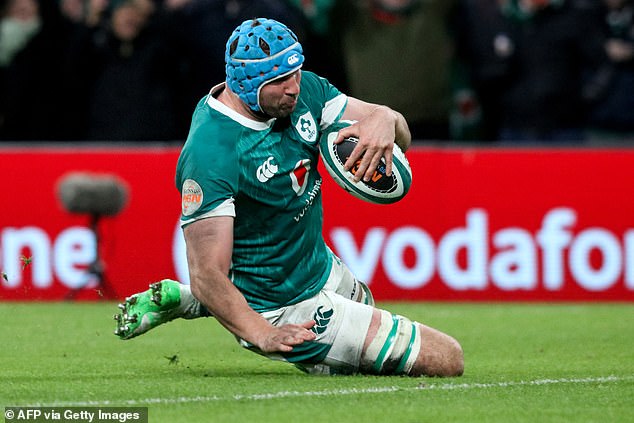- England’s defensive frailties were laid bare in defeat by Ireland at Aviva Stadium
- Steve Borthwick’s men started brightly against reigning Six Nations champions
- But a poor second-half performance allowed Ireland to claim victory in Dublin
Dry January is over and the beer taps in Dublin’s pubs were in full flow. England’s fans arrived with a glass-half-full mentality, toasting a new era under Maro Itoje‘s captaincy, but by the end of the night it felt like the Guinness had been spilt all over the carpet.
It all started so well. England battled their way to a half-time lead but, continuing the story of 2024, the evening ended with another defeat. They punched themselves out of the fight, conceding 22 unanswered points as Ireland got their title defence underway with a win.
England have now suffered seven defeats in nine and the pressure continues to build on Steve Borthwick‘s shoulders. France are waiting around the corner. He watched his team run out of fuel with their defensive linespeed, with two late tries papering over the cracks of a second-half implosion.
Outside the ground, touts were selling tickets for 300 Euros a piece. Ireland had lost just two of their previous 29 Six Nations games in Dublin, becoming the hottest ticket in town.
The run continued after they watched England’s early physical promise go up in a puff of fatigue and indiscipline.
From the start, England tried to catch the Irish by surprise. Marcus Smith sent his kick-off straight down the middle and Freddie Steward chased the ball to slap it back. They went in hunt of unstructured attacking positions.



If the Irish defence settled into a sturdy wall in the middle of the pitch, Alex Mitchell would kick the ball away within three phases.
With nine minutes on the clock, Sam Prendergast sent a long kick downfield and it ended up in Smith’s hands. Smith played like a tortured poet in the autumn, running into the fire and often running out of support.
Team-mates were too slow to react to his late, instinctive movement but Borthwick is determined to harness his talent.
Ollie Lawrence was on Smith’s shoulder and the ball was recycled at speed. Henry Slade spotted space down the left wing and threaded through a grubber kick for Cadan Murley to score on debut. During the first half, England dominated the territorial kicking and their back-row swarmed the breakdown.
They weathered defensive storms and Itoje had to show his art of diplomacy with the referee. ‘May I talk to them?’ he politely asked Ben O’Keefe after the first penalty warning.
Moments later, Ireland broke through to score but Itoje’s leg was being held. The try was awarded but Itoje pleaded for a review and the score was subsequently overruled.
Borthwick will take positives from the fight his team showed. ‘Gengey, whack him’ shouted Ben Earl as they repelled the green wave. There were aggressive and organised, ferocious at times, but they looked like a team that opted for a sprint start in a long-distance race.
When Smith was sin-binned for running offside, the Curry brothers, Tom and Ben, held the fort with turnover after turnover. Simon Easterby cut a frustrated figure in the Irish coaching box as England, softening their edges in defence, kept the Irish wingers under wraps.



Eventually, the resistance was broken. James Lowe used his power to break through Alex Mitchell’s tackle down the left wing and Jamison Gibson-Park was in support to score Ireland’s first try after 35 minutes.
But the final play of the half belonged to England. Attacking from a no-jump lineout – boxing smart with their shortened jumping options – Earl broke through the middle and the attack ended with a three-point penalty for the visitors. For 40 minutes, Borthwick’s selection gamble was vindicated.
On the morning newsracks, one of the headlines on the local newspapers asked if Ireland’s attack has been worked out.
During the autumn campaign, they scored just one try that emanated outside of the 22. Their spawning attacking pods come to life near the opposition tryline but if that comes unstuck then what next?
They quickly proved their critics wrong. Early in the second half, things began to unravel for England. They conceded a scrum penalty, before Murley’s catastrophic judgement under the highball ended with him being trapped deep in his own half.
A poor clearance kick gave Ireland an attacking lineout and the pressure built up. Gibson-Park found Bundee Aki lurking on the left wing and Ireland’s heavyweight centre ran over the top of Smith, beating the last line of defence to level the score.
Back-to-back penalties for a push on Hansen and a push in the lineout allowed Prendergast to kick the hosts ahead for the first time. The points kept coming and there was nothing England could do about it.
They conceded seven penalties in the second half. England gradually unloaded their bench. They brought on their big units but they did not have a big impact.



Chandler Cunningham-South conceded a clumsy penalty for taking out the man in the air and Ireland capitalised. Attacking from the lineout, Gibson-Park exploited the tired English fringe defence, with Lowe and Tadhg Beirne combining for a high-tempo score.
Murley was again exposed in defence, with the Test arena showing no mercy to the debutant. Harry Randall’s box kick travelled nowhere and Ireland needed no second invitation.
Jack Conan punched through a hole in midfield, before Lowe and Dan Sheehan combined down the left wing for another score.
Tom Curry and Tommy Freeman scored in the final minutes to clinch a losing bonus point for the English efforts, but it was not enough to stop Itoje’s new era from beginning with a familiar old feeling.


